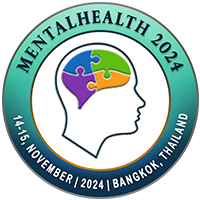
Daniela Yoshida
Ratio College and Cruzeiro do Sul University, BrazilTitle: Preliminary study for Neurovisual Assessment Model using Eye Tracking (NAMET) related to cognitive functions for TBI patients
Abstract
Traumatic brain injury can cause visual dysfunction (if not treated with Vision therapy) and it can hinder a patient's rehabilitative progress. Rehabilitation is an important part of recovery after a traumatic brain injury and a Visual Information Processing Assessment found some visual symptoms in TBI patients at the HCFMUSP Neurology Clinic. Previous literature presents common visual symptoms are same as founded as listed below:
visual field loss;
double vision;
posture and balance difficulties;
blurred vision;
attention and concentration problems;
difficulties in near visual tasks;
headaches;
reading difficulties;
reading problems;
motor coordination problems;
difficulties locating objects accurately;
accommodative dysfunction;
convergence insufficiency
This study presents a Neuro Visual Assessment Model for Visual and cognitive rehabilitation post - TBI and it can include Visual Acuity (VA) Visual Field, eye movements (Eye Tracking), Accommodation and Convergence.
Results: In the preliminary study, there was similarity found between existing literature and visual dysfunctions from patients post - TBI.
Conclusion: Visual assessment protocol for post - TBI patients can identify changes in saccadic eye movements, segments and their impacts on cognitive functions, sensory, motor and emotional systems. The treatment to improve visual dysfunctions can improve Reading problems; oculomotor, balance and binocular disorders using prisms, lenses and filters for both attention and concentration difficulties. Literature shows cases of improvement post-TBI visual symptoms using nonfunctional lenses, prisms, filters, binasal occlusions. Previous literature can found cases of improvement of depressive symptoms, aggressive behavior, self-confidence, self-esteem, posture, balance, and cognitive rehabilitation process with other professionals from a Transdisciplinary team.
Biography
Daniela YoshidaA is a Writer; professor; Neurocognitive Optometrist; Bachelor in Marketing (USP); Technologist in Optics and Optometry (UBC); Postgraduate in Neuroeducation (UBC); She has complementary courses in: Mental training, Digital Acupuncture, Aromatherapy, Crystal therapy, Chromotherapy, Behavioral Optometry, Digital Acupuncture; Syntonic and Primitive Reflexes (BRMT International).

